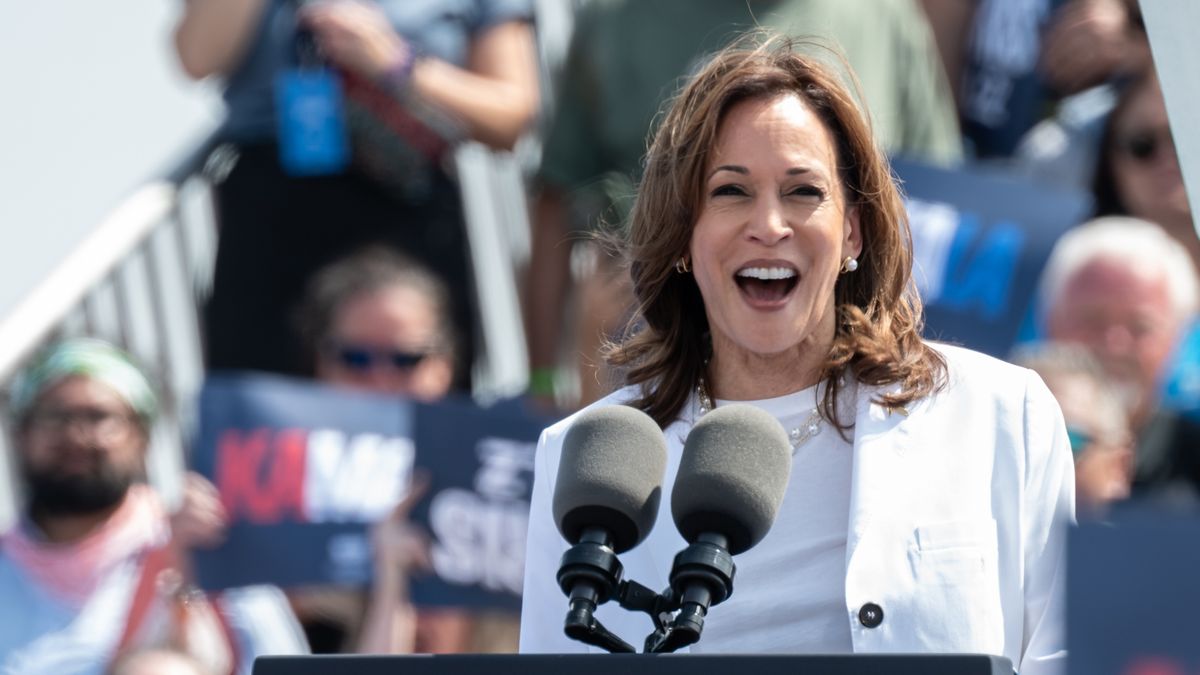With ads on IGN, Harris and allies make a push for the gamer vote
Vice President Kamala Harris speaks at a rally in Wisconsin in August. (MUST CREDIT: Caroline Yang for The Washington Post)
In an ongoing outreach effort to young male voters, Democratic presidential nominee Kamala Harris’s campaign bought advertising space on IGN, the world’s biggest games media outlet.
Static and video ads will appear on the site beginning Wednesday. Two static ads promote Harris as “fighting for a new way forward” and “a fighter for the American people,” presented in pixelized fonts and imagery. Two of the ads raise alarms about Project 2025, a policy tome created by the conservative Heritage Foundation whose wish list of far-right policies have made it a central target of the Democratic campaign - including in its outreach to young voters.
Another 15-second ad spot highlights how Republican presidential nominee Donald Trump used racially insensitive words tying the pandemic to Asian Americans, and stating that the former Republican president “unleashed a wave of hate” with those words. IGN attracts about 35 million Asian American visitors a month, and about 80 percent of the site’s audience is male, according to the Harris-Walz campaign. These ads will display only in battleground states.
The ads, and a separate “Geeks & Nerds for Harris” fundraiser held online Tuesday, highlight a tussle - played out across streaming, social and gaming platforms - over a potentially decisive slice of young male voters. The Trump campaign has courted them aggressively as it lags with women voters.
Trump’s campaign ramped up its outreach to young male voters through similar targeted digital advertising, as well as appearances with notable and controversial content creators such as YouTuber Logan Paul and Adin Ross, a popular 23-year-old streamer banned from Twitch for “unmoderated hateful conduct in chat.”
A spokesman from the Trump campaign said Wednesday that the Democratic candidate needs to pay to reach these audiences, while enthusiasm for Trump within gaming communities is organic. The campaign cited support from Ross, Xqc, Nickmercs and Faze Banks, some of the most popular and controversial streamers. Each of them has millions of followers and subscribers across multiple platforms.
IGN did not respond to a request for comment about its history with political advertising. The company’s advertising specs sheet online specifies that if it does accept political ads from one candidate, “we may accept advertising from all others” in a race “on comparable terms and conditions.”
IGN is the most influential news site in the gaming world, boasting about 250 million monthly users worldwide. That position has made it a lightning rod for controversy and conversation, as culture wars and the country’s political climate have roiled games communities online.
Harris has similarly appeared on other platforms with predominantly male audiences, including a recent video for Wired Magazine’s popular “The Web’s Most Searched Questions” series that has gained more than 1.3 million views in four days. She’s also appeared with content creators such as Track Star, which quizzes celebrities on music. The Harris campaign started a channel on Twitch, Amazon’s live stream service, to stream rallies and public events. (Amazon founder Jeff Bezos owns The Washington Post.)
Some celebrities with roots in comics and gaming fandoms have joined the fray.
While the Trump campaign boasts organic enthusiasm for Trump, Harris fundraisers were also started at a grassroots level. In July, a “White Dudes for Harris” event raised about $4 million for the Harris campaign, and it drew more than 190,000 people, including stars such as Star Wars hero and voice of the Joker, Mark Hamill.
Efforts like that and the “White Women for Harris” Zoom call inspired TV’s Wonder Woman and Washington resident Lynda Carter to organize her own effort, “Geeks & Nerds for Harris.” Carter’s late husband was Robert A. Altman, founder of ZeniMax Media, which was the parent company of legendary games studio Bethesda Softworks in Maryland. In 2017, Carter was the face of a Bethesda marketing campaign highlighting single-player games.
Carter’s fundraiser featured many guest stars, including Hamill; the cast of “The Boys”; veteran Superman, Wonder Woman and Deadpool comics writer Gail Simone; and geek-inclined lawmakers Sen. Cory Booker (D-N.J.) and Rep. Robert Garcia (D-Calif.) - the latter known for swearing into office on the Library of Congress’s copy of the first issue of Superman. It had a competitive twist, assigning celebrities to teams of Earth and space to face off against each other to raise money. Her communications team sparked the idea when they considered how “fandoms” of superheroes and video games are activated in community-organizing events such as conventions.
“At the heart of comics and the popular arts is this idea of social justice,” Garcia said during Tuesday’s live stream.
“When you look back over time, why did people in power want to put their faces everywhere, why did they build statues and need to promote themselves with images everywhere? That was fan activism,” Carter told The Washington Post. “It was really to endear themselves to the people. Fan activism has become something different, and it has in our current times morphed into a voting bloc, as we’ve witnessed in a disturbing way.”

